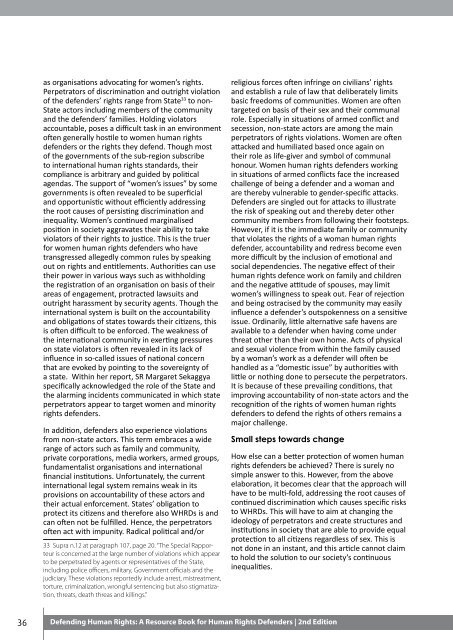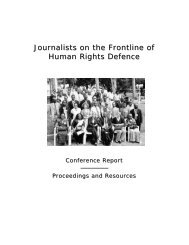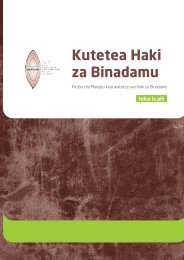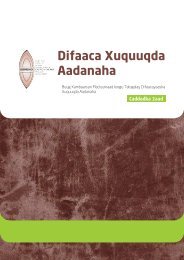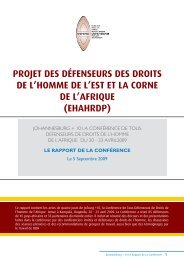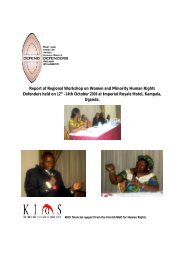Defending Human Rights: A Resource Book for Human
Defending Human Rights: A Resource Book for Human
Defending Human Rights: A Resource Book for Human
Create successful ePaper yourself
Turn your PDF publications into a flip-book with our unique Google optimized e-Paper software.
as organisations advocating <strong>for</strong> women’s rights.<br />
Perpetrators of discrimination and outright violation<br />
of the defenders’ rights range from State 33 to non-<br />
State actors including members of the community<br />
and the defenders’ families. Holding violators<br />
accountable, poses a difficult task in an environment<br />
often generally hostile to women human rights<br />
defenders or the rights they defend. Though most<br />
of the governments of the sub-region subscribe<br />
to international human rights standards, their<br />
compliance is arbitrary and guided by political<br />
agendas. The support of “women’s issues” by some<br />
governments is often revealed to be superficial<br />
and opportunistic without efficiently addressing<br />
the root causes of persisting discrimination and<br />
inequality. Women’s continued marginalised<br />
position in society aggravates their ability to take<br />
violators of their rights to justice. This is the truer<br />
<strong>for</strong> women human rights defenders who have<br />
transgressed allegedly common rules by speaking<br />
out on rights and entitlements. Authorities can use<br />
their power in various ways such as withholding<br />
the registration of an organisation on basis of their<br />
areas of engagement, protracted lawsuits and<br />
outright harassment by security agents. Though the<br />
international system is built on the accountability<br />
and obligations of states towards their citizens, this<br />
is often difficult to be en<strong>for</strong>ced. The weakness of<br />
the international community in exerting pressures<br />
on state violators is often revealed in its lack of<br />
influence in so-called issues of national concern<br />
that are evoked by pointing to the sovereignty of<br />
a state. Within her report, SR Margaret Sekaggya<br />
specifically acknowledged the role of the State and<br />
the alarming incidents communicated in which state<br />
perpetrators appear to target women and minority<br />
rights defenders.<br />
In addition, defenders also experience violations<br />
from non-state actors. This term embraces a wide<br />
range of actors such as family and community,<br />
private corporations, media workers, armed groups,<br />
fundamentalist organisations and international<br />
financial institutions. Un<strong>for</strong>tunately, the current<br />
international legal system remains weak in its<br />
provisions on accountability of these actors and<br />
their actual en<strong>for</strong>cement. States’ obligation to<br />
protect its citizens and there<strong>for</strong>e also WHRDs is and<br />
can often not be fulfilled. Hence, the perpetrators<br />
often act with impunity. Radical political and/or<br />
33 Supra n.12 at paragraph 107, page 20. “The Special Rapporteur<br />
is concerned at the large number of violations which appear<br />
to be perpetrated by agents or representatives of the State,<br />
including police officers, military, Government officials and the<br />
judiciary. These violations reportedly include arrest, mistreatment,<br />
torture, criminalization, wrongful sentencing but also stigmatization,<br />
threats, death threas and killings.”<br />
religious <strong>for</strong>ces often infringe on civilians’ rights<br />
and establish a rule of law that deliberately limits<br />
basic freedoms of communities. Women are often<br />
targeted on basis of their sex and their communal<br />
role. Especially in situations of armed conflict and<br />
secession, non-state actors are among the main<br />
perpetrators of rights violations. Women are often<br />
attacked and humiliated based once again on<br />
their role as life-giver and symbol of communal<br />
honour. Women human rights defenders working<br />
in situations of armed conflicts face the increased<br />
challenge of being a defender and a woman and<br />
are thereby vulnerable to gender-specific attacks.<br />
Defenders are singled out <strong>for</strong> attacks to illustrate<br />
the risk of speaking out and thereby deter other<br />
community members from following their footsteps.<br />
However, if it is the immediate family or community<br />
that violates the rights of a woman human rights<br />
defender, accountability and redress become even<br />
more difficult by the inclusion of emotional and<br />
social dependencies. The negative effect of their<br />
human rights defence work on family and children<br />
and the negative attitude of spouses, may limit<br />
women’s willingness to speak out. Fear of rejection<br />
and being ostracised by the community may easily<br />
influence a defender’s outspokenness on a sensitive<br />
issue. Ordinarily, little alternative safe havens are<br />
available to a defender when having come under<br />
threat other than their own home. Acts of physical<br />
and sexual violence from within the family caused<br />
by a woman’s work as a defender will often be<br />
handled as a “domestic issue” by authorities with<br />
little or nothing done to persecute the perpetrators.<br />
It is because of these prevailing conditions, that<br />
improving accountability of non-state actors and the<br />
recognition of the rights of women human rights<br />
defenders to defend the rights of others remains a<br />
major challenge.<br />
Small steps towards change<br />
How else can a better protection of women human<br />
rights defenders be achieved There is surely no<br />
simple answer to this. However, from the above<br />
elaboration, it becomes clear that the approach will<br />
have to be multi-fold, addressing the root causes of<br />
continued discrimination which causes specific risks<br />
to WHRDs. This will have to aim at changing the<br />
ideology of perpetrators and create structures and<br />
institutions in society that are able to provide equal<br />
protection to all citizens regardless of sex. This is<br />
not done in an instant, and this article cannot claim<br />
to hold the solution to our society’s continuous<br />
inequalities.<br />
36<br />
<strong>Defending</strong> <strong>Human</strong> <strong>Rights</strong>: A <strong>Resource</strong> <strong>Book</strong> <strong>for</strong> <strong>Human</strong> <strong>Rights</strong> Defenders | 2nd Edition


